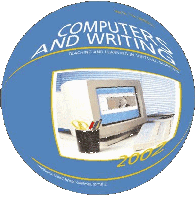 | "Distance education is no longer the great evil. Many DE techniques and strategies are used in more traditional learning environments. In fact, it is often said that the distance between a lecturer and a student is greater than the distance between teachers and students in DE environments. This is difficult to pull off as a teacher, and even more difficult from the administrative side. There are competing forces at work. Still, we're all on the same time, aren't we?"
Mark Walbert -
Pete Sands -
Judi Kirkpatrick -
Susan Lang -
Joel English -
Trish Harris -
Cynthia Jeney -
|
|
Trish Harris – "Profit and Pedagogy: Addressing the Challenges and Achieving Balance"
I am a writer and writing coach. I have written with middle-schoolers, university students, community college students, ESL students, homeschoolers, poet friends, people who never suspected I was getting them to write outside their box until they were finished doing it. I have taught writing face to face, online, on the phone, in 3 a.m. emails, in MOOs, in coffeehouses, in factories, in the sun next to construction trailers, at writing lab tables, with Bank Street Writer back in the mid 80's, at my dining room table. I've had 80 completely online writing students at a time. From chalkboard to whiteboard to Elmo, from pencil to pen to keyboard to stylus, I, like most of you, have thought and rethought how to get writers, including myself, to that next step, to that next way of thinking and expressing thought.
For the past few years, I've also been the employee of a for-profit corporation, a dot commie, an educational consultant, a trainer, a system admin, a de facto distance education administrator at a public institution.
A small thing I've learned from living on both sides: there are no longer any sides. The lines have blurred. I want to be the best teacher ever but I also need to make load. I want the biggest market share but to do so I need to know something important, something potentially revolutionary, about education, pedagogy, how to learn. Students do think like the consumers they are. We have started to realize that what we offer is a product. Colleges are run more like businesses. Some corporations dealing in higher-ed products are thinking more like the teachers and college administrators they, through their product/proxy lines, really are becoming. Businesses and universities use the same communication tools, collaboration tools, vocabulary, jargon.
My earliest adopters were, are, writing teachers. The CIS and mathematics and even literature folks came soon after, but my first online teachers were writing teachers. Why is this?
Our discipline fosters self-questioning. Revision of technique and approach. Collaboration. Group work. Sharing. Process. All the activities served so well by digital media and, by extension, asynchronous (and synchronous) tools used in distance education. Writing teachers make it clear every day that what we do is not distance education but connected learning. We take what we already do – facilitating better thinking, clearer expression – and move it to the next level, allowing students to connect and learn at their rate(s) and within their comfort zone(s).
Our administrations have other motivations. Hearing the call of industry, agreeing to corporate sponsorships and partnerships, feeling the pressure of competition that may or may not exist, all fueled heavy investment in information technology infrastructures, servers, ATM to the desktop, Ethernet in every classroom, wireless labs, mobile laptop labs. And that infrastructure, powerful as it is, is aging as it is installed. And administrators feel the pressure, the clock ticking on their investment. They have an eye on accountability, and they want to see a return on their investment. They look on their early adopters and see that they are good. But they want their mainstream faculty to come into the fold, too. They want everyone to use, to take advantage of, to wear out, the infrastructure they've built.
If you're a writing program administrator, or a dean, or an early adopter, or mainstream faculty member, or grad student working to earn any of these designations, what can you do to address these issues and challenges?
- Share what you know. Building an open source body of knowledge is among the most revolutionary and cost-effective things you can do for yourself, your institution, and your discipline. If you are just getting started or have limited resources at your institution, look into MERLOT or the independent users groups or listservs for shareable materials and support.
- Know when you've had enough. If you're a teacher facing burnout, listen to your signals and step away from your stress before the profession loses another dedicated person. If you're an administrator working with early adopters and achievers, cultivate a sensitivity to early signs of burnout.
- Ask a newbie to mentor you – or consider a bi-directional mentorship. Acknowledge that wisdom is not all technical. Embrace all dimensions of teaching and learning.
- Consider a foray into the for-profit zone, even if part-time or on contract. Write a textbook, do a little educational consulting, sit on a product advisory board. See how both sides work, and return to work feeling refreshed and less embattled. If you're already a dotcommie, keep at least a toe – preferably a whole foot – in teaching. Balance in all things.
- Remember why you started teaching writing. You know that "philosophy of teaching" statement you wrote when you were interviewing? Take it out, read it again, revise it, and remember.
Corporations and educators are not on opposite sides of the court. We urge each other toward improvements we might not have otherwise considered. The administration's infatuation with the bottom line, and the corporate world's desire for market share, will achieve balance as teachers continue to resist homogeneity and risk what seems like everything to help learners understand, think, and write.
 
|
|
